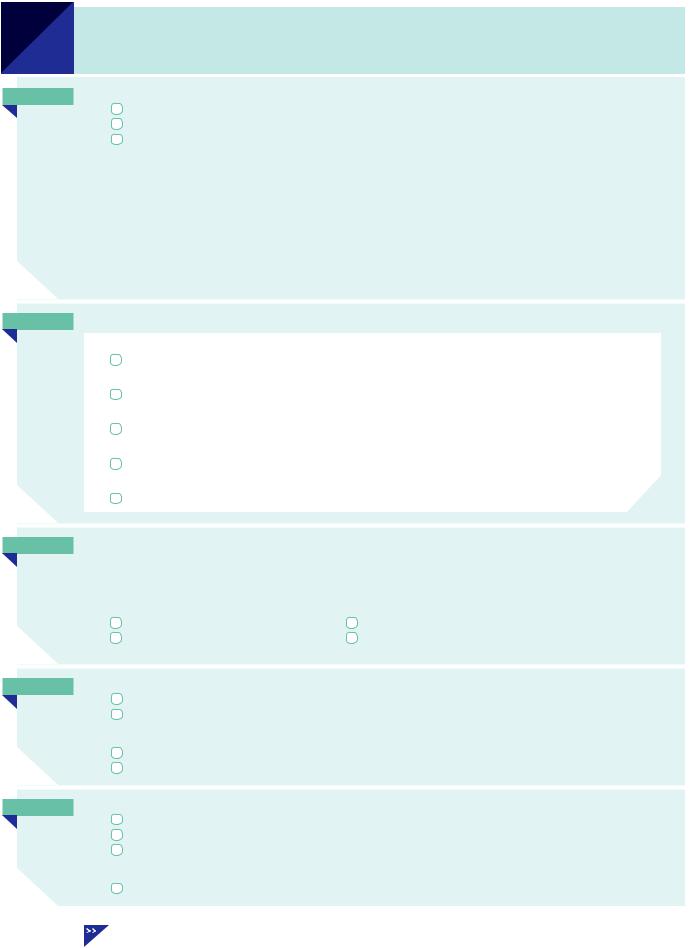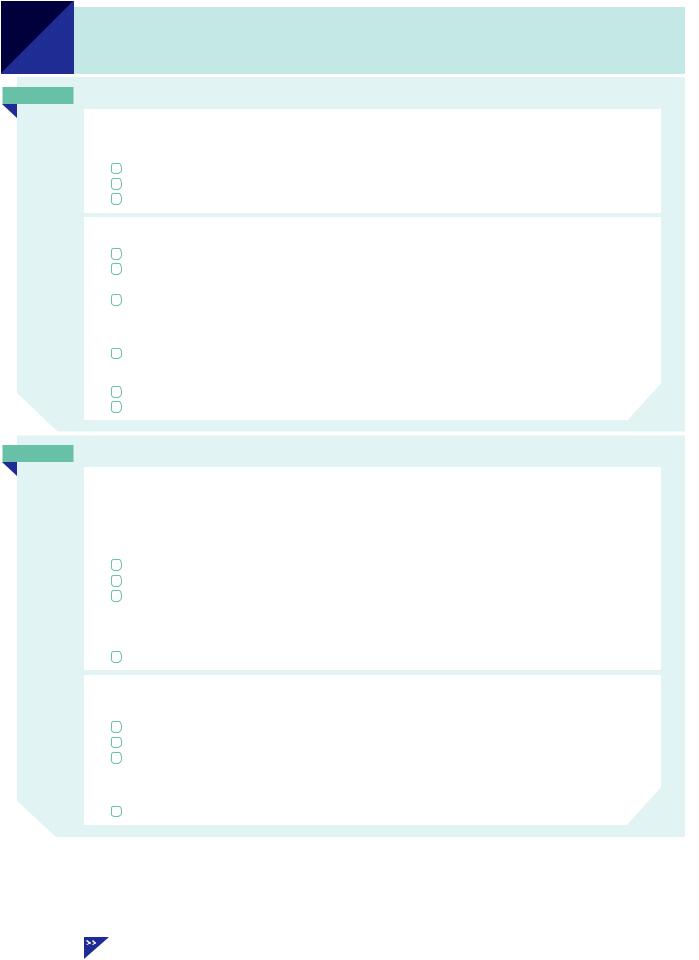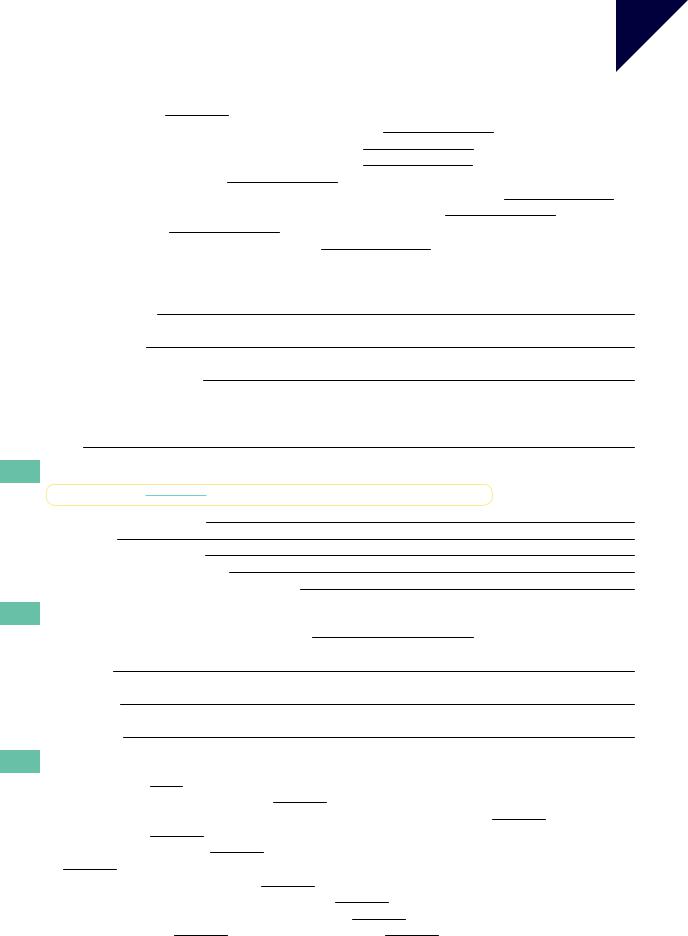
- •Contents
- •Thanks
- •To the student
- •To the teacher
- •3 Present continuous and present simple 1 (I am doing and I do)
- •10 Present perfect continuous and simple (I have been doing and I have done)
- •11 how long have you (been) … ?
- •12 for and since when … ? and how long … ?
- •13 Present perfect and past 1 (I have done and I did)
- •14 Present perfect and past 2 (I have done and I did)
- •15 Past perfect (I had done)
- •16 Past perfect continuous (I had been doing)
- •17 have and have got
- •18 used to (do)
- •19 Present tenses (I am doing / I do) for the future
- •20 I’m going to (do)
- •21 will and shall 1
- •22 will and shall 2
- •23 I will and I’m going to
- •24 will be doing and will have done
- •26 can, could and (be) able to
- •27 could (do) and could have (done)
- •28 must and can’t
- •29 may and might 1
- •30 may and might 2
- •31 have to and must
- •32 must mustn’t needn’t
- •33 should 1
- •34 should 2
- •35 I’d better … it’s time …
- •36 would
- •39 if I knew … I wish I knew …
- •40 if I had known … I wish I had known …
- •41 wish
- •42 Passive 1 (is done / was done)
- •43 Passive 2 (be done / been done / being done)
- •44 Passive 3
- •45 it is said that … he is said to … he is supposed to …
- •46 have something done
- •47 Reported speech 1 (he said that …)
- •48 Reported speech 2
- •49 Questions 1
- •52 Question tags (do you? isn’t it? etc.)
- •53 Verb + -ing (enjoy doing / stop doing etc.)
- •54 Verb + to … (decide to … / forget to … etc.)
- •55 Verb (+ object) + to … (I want you to …)
- •56 Verb + -ing or to … 1 (remember, regret etc.)
- •57 Verb + -ing or to … 2 (try, need, help)
- •58 Verb + -ing or to … 3 (like / would like etc.)
- •59 prefer and would rather
- •60 Preposition (in/for/about etc.) + -ing
- •61 be/get used to … (I’m used to …)
- •63 there’s no point in -ing, it’s worth -ing etc.
- •64 to … , for … and so that …
- •65 Adjective + to …
- •66 to … (afraid to do) and preposition + -ing (afraid of -ing)
- •67 see somebody do and see somebody doing
- •68 -ing clauses (He hurt his knee playing football.)
- •69 Countable and uncountable 1
- •70 Countable and uncountable 2
- •71 Countable nouns with a/an and some
- •74 the 2 (school / the school etc.)
- •75 the 3 (children / the children)
- •77 Names with and without the 1
- •78 Names with and without the 2
- •79 Singular and plural
- •80 Noun + noun (a bus driver / a headache)
- •81 -’s (your sister’s name) and of … (the name of the book)
- •82 myself/yourself/themselves etc.
- •83 a friend of mine my own house on my own / by myself
- •84 there … and it …
- •85 some and any
- •87 much, many, little, few, a lot, plenty
- •90 all every whole
- •91 each and every
- •92 Relative clauses 1: clauses with who/that/which
- •94 Relative clauses 3: whose/whom/where
- •95 Relative clauses 4: extra information clauses (1)
- •96 Relative clauses 5: extra information clauses (2)
- •97 -ing and -ed clauses (the woman talking to Tom, the boy injured in the accident)
- •98 Adjectives ending in -ing and -ed (boring/bored etc.)
- •99 Adjectives: a nice new house, you look tired
- •100 Adjectives and adverbs 1 (quick/quickly)
- •102 so and such
- •104 quite, pretty, rather and fairly
- •105 Comparative 1 (cheaper, more expensive etc.)
- •106 Comparative 2 (much better / any better etc.)
- •107 Comparative 3 (as … as / than)
- •108 Superlative (the longest / the most enjoyable etc.)
- •109 Word order 1: verb + object; place and time
- •110 Word order 2: adverbs with the verb
- •111 still any more yet already
- •112 even
- •114 in case
- •116 as (as I walked … / as I was … etc.)
- •117 like and as
- •119 during for while
- •121 at/on/in (time)
- •122 on time and in time at the end and in the end
- •123 in/at/on (position) 1
- •124 in/at/on (position) 2
- •125 in/at/on (position) 3
- •126 to, at, in and into
- •127 in/on/at (other uses)
- •129 Noun + preposition (reason for, cause of etc.)
- •130 Adjective + preposition 1
- •131 Adjective + preposition 2
- •132 Verb + preposition 1 to and at
- •134 Verb + preposition 3 about and of
- •135 Verb + preposition 4 of/for/from/on
- •136 Verb + preposition 5 in/into/with/to/on
- •137 Phrasal verbs 1 Introduction
- •138 Phrasal verbs 2 in/out
- •139 Phrasal verbs 3 out
- •142 Phrasal verbs 6 up/down
- •143 Phrasal verbs 7 up (1)
- •144 Phrasal verbs 8 up (2)
- •145 Phrasal verbs 9 away/back
- •Additional exercises
- •Study guide
- •Key to Exercises
- •Key to Additional exercises (see page 302)
- •Key to Study guide
- •Index

Unit
121 at/on/in (time)
ACompare at, on and in:
They arrived at 5 o’clock.
They arrived on Friday.
They arrived in June. / They arrived in 2012.
We use:
at for the time of day |
|
|
|
|
|
|
|
at five o’clock |
at 11.45 |
at midnight |
at lunchtime |
at sunset |
etc. |
|
|
|
|
|
|
|
|
|
|
on for days and dates |
|
|
|
|
|
|
|
on Friday / on Fridays |
on 16 May 2012 |
on New Year’s Day |
on my birthday |
|
|||
|
|
|
|
|
|||
in for longer periods (months/years/seasons etc.) |
|
|
|
|
|||
in June in 2012 |
|
in the 1990s in the 20th century in the past in winter |
|
||||
|
|
|
|
|
|
|
|
BWe say:
at the moment / at the minute / at present / at this time (= now):
Can we talk later? I’m busy at the moment.
at the same time
Kate and I arrived at the same time.
at the weekends / at weekends (or on the weekend / on weekends in American English):
Will you be here at the weekend? (or … on the weekend)
at Christmas (but on Christmas Day)
Do you give each other presents at Christmas?
at night (= during nights in general), in the night (= during a particular night):
I don’t like working at night. but I was woken up by a noise in the night.
C We say:
in the morning(s) |
but |
on Friday morning(s) |
in the aternoon(s) |
|
on Sunday aternoon(s) |
in the evening(s) |
|
on Monday evening(s) etc. |
I’ll see you in the morning. |
I’ll see you on Friday morning. |
|
Do you work in the evenings? |
Do you work on Saturday evenings? |
|
|
|
|
DWe do not use at/on/in before last/next/this/every:
I’ll see you next Friday. (not on next Friday)
They got married last June.
We oten leave out on before days. So you can say:
I’ll see you on Friday. or I’ll see you Friday.
I don’t work on Monday mornings. or I don’t work Monday mornings.
EWe say that something will happen in a few minutes / in six months etc. :
The train will be leaving in a few minutes. (= a few minutes from now)
Andy has gone away. He’ll be back in a week. (= a week from now)
They’ll be here in a moment. (= a moment from now, very soon)
We also use in … to say how long it takes to do something:
I learnt to drive in four weeks. (= it took me four weeks to learn)
|
on/in time, at/in the end Unit 122 in/at/on (position) Units 123–125 in/at/on (other uses) Unit 127 |
242 |
American English Appendix 7 |

Exercises
121.1 |
Put in at, on or in. |
|
|
|
|
|
|
1 |
Mozart was born in Salzburg in 1756. |
|
|
|
|||
2 |
I’ve been invited to a wedding |
14 February. |
|
|
|||
3 |
Amy’s birthday is |
May, but I don’t know which date. |
|
|
|||
4 |
This park is popular and gets very busy |
|
weekends. |
|
|
||
5 |
I haven’t seen Kate for a few days. I last saw her |
Tuesday. |
|
||||
6 |
Jonathan is 63. He’ll be retiring from his job |
two years. |
|
||||
7 |
I’m busy right now. I’ll be with you |
a moment. |
|
|
|||
8 |
Sam isn’t here |
the moment, but he’ll be here this aternoon. |
|
||||
9 |
There are usually a lot of parties |
New Year’s Eve. |
|
|
|||
10 |
I don’t like the dark. I try to avoid going out |
night. |
|
|
|||
11 |
It rained very hard |
the night. Did you hear it? |
|
|
|||
12 |
My car is being repaired at the garage. It will be ready |
two hours. |
|
||||
13 |
The bus station was busy. A lot of buses were leaving |
the same time. |
|||||
14 |
Helen and David always go out for dinner |
their wedding anniversary. |
|||||
15 |
It was a short book and easy to read. I read it |
a day. |
|
|
|||
16 |
midday, the sun is at its highest point in the sky. |
|
|
||||
17 |
This building is very old. It was built |
the fiteenth century. |
|
||||
18 |
The ofice is closed |
Wednesday aternoons. |
|
|
|||
19 |
In the UK many people go home to see their families |
Christmas. |
|
||||
20 |
My flight arrives |
5 o’clock |
the morning. |
|
|
||
21 |
The course begins |
7 January and ends sometime |
April. |
|
|||
22 |
I might not be at home |
Tuesday morning, but I’ll be there |
the aternoon. |
||||
Unit
121
121.2 Complete the sentences. Use at, on or in + the following:
the evening |
about 20 minutes |
1756 |
the same time |
the 1920s |
the moment |
21 July 1969 |
night |
Saturdays |
11 seconds |
1 Mozart was born
2 If the sky is clear, you can see the stars
3 Ater working hard during the day, I like to relax
4 Neil Armstrong was the first man to walk on the moon 5 It’s dificult to listen if everyone is speaking
6 Jazz became popular in the United States 7 I’m just going out to the shop. I’ll be back
8 I don’t think we need an umbrella. It’s not raining 9 Ben is a very fast runner. He can run 100 metres
10 Lisa works from Monday to Friday. Sometimes she also works
121.3 Which is correct: a, b, or both of them?
1 |
a |
I’ll see you on Friday. |
2 |
a |
I’ll see you on next Friday. |
3 |
a |
Paul got married in April. |
4 |
a |
I play tennis on Sunday mornings. |
5 |
a |
We were ill at the same time. |
6 |
a |
What are you doing at the weekend? |
7 |
a |
Oliver was born at 10 May 1993. |
8 |
a |
He let school last June. |
9 |
a |
Will you be here on Tuesday? |
10 a |
I don’t like driving in night. |
|
bI’ll see you Friday.
bI’ll see you next Friday.
bPaul got married April.
bI play tennis Sunday mornings.
bWe were ill in the same time.
bWhat are you doing on the weekend?
bOliver was born on 10 May 1993.
bHe let school in last June.
bWill you be here Tuesday?
bI don’t like driving at night.
.
.
.
.
.
.
.
.
.
.
both b
Additional exercise 33 (page 321) |
243 |

Unit
122 on time and in time at the end and in the end
Aon time and in time
on time = punctual, not late
If something happens on time, it happens at the time that was planned:
The 11.45 train let on time. (= it let at 11.45)
Please be on time. Don’t be late.
The conference was well-organised. Everything began and finished on time.
in time (for something / to do something) = soon enough
Will you be home in time for dinner? (= soon enough for dinner) I sent Amy a birthday present. I hope it arrives in time.
(= on or before her birthday)
I’m in a hurry. I want to get home in time to watch the game on TV. (= soon enough to see the game)
The opposite of in time is too late:
I got home too late to watch the game on TV.
You can say just in time (= almost too late):
We got to the station just in time for our train.
A child ran into the road in front of the car, but I managed to stop just in time.
Bat the end and in the end
at the end (of something) = at the time when something ends
For example:
at the end of the month at the end of the film
at the end of January at the end of the course
at the end of the game at the end of the concert
I’m going away at the end of January / at the end of the month.
At the end of the concert, everyone applauded.
The players shook hands at the end of the game.
We do not say ‘in the end of …’. For example, we do not say ‘in the end of January’.
The opposite of at the end is at the beginning:
I’m going away at the beginning of January. (not in the beginning)
in the end = finally
We use in the end when we say what the final result of a situation was:
We had a lot of problems with our car. We sold it in the end. (= finally we sold it)
He got more and more angry. In the end he just walked out of the room.
Alan couldn’t decide where to go for his holidays. He didn’t go anywhere in the end. (not at the end)
The opposite of in the end is at first:
At first we didn’t get on very well, but in the end we became good friends.
244 |
at/on/in (time) Unit 121 |

Exercises |
|
|
|
|
|
Unit |
||
|
|
|
|
|
122 |
|||
|
|
|
|
|
|
|||
|
|
|
|
|
||||
122.1 |
Complete the sentences with on time or in time. |
|
|
|
|
|||
1 |
The bus is usually |
on time |
, but it was late this morning. |
|
|
|
|
|
2 |
The film was supposed to start at 8.30, but it didn’t begin |
|
. |
|
|
|||
3 |
The train service isn’t very good. The trains are rarely |
|
. |
|
|
|||
4 |
We nearly missed our train. We got to the station just |
|
. |
|
|
|||
5 |
We want to start the meeting |
, so please don’t be late. |
|
|
|
|||
6 |
I’ve just washed this shirt. I want to wear it this evening, so I hope it will be dry |
. |
||||||
7 |
I almost forgot that it was Joe’s birthday. Fortunately I remembered |
|
. |
|
||||
8 |
Why are you never |
|
? You always keep everybody waiting. |
|
|
|||
9 |
It is hoped that the new stadium will be ready |
for the tournament later this year. |
||||||
|
|
|
|
|
||||
122.2 |
Read the situations and make sentences using just in time. |
|
|
|
|
|||
1 |
A child ran into the road in front of your car. You saw the child at the last moment. |
|
|
|||||
|
|
(manage / stop) |
I managed to stop just in time. |
|
|
|
|
|
2You were walking home. Just ater you got home, it started to rain very heavily. (get / home) I
3Your friend was going to sit on the chair you had just painted. You said, ‘Don’t sit on that chair!’, so he didn’t. (stop / him) I
4You and a friend went to the cinema. You were late, and you thought you would miss the beginning of the film. But the film began just as you sat down in the cinema.
(get / cinema / beginning / film) We
122.3Complete the sentences using at the end + the following:
|
the course |
the game |
the interview |
the month |
the race |
1 |
The players shook hands |
at the end of the game |
. |
||
2 |
I get paid |
|
|
|
. |
3 |
The students had a party |
|
|
. |
|
4 |
Two of the runners collapsed |
|
. |
||
5 |
I was surprised when I was ofered the job |
|
. |
||
122.4 Write sentences with in the end. Use the verb in brackets.
1 We had a lot of problems with our car. (sell)
2Anna got more and more fed up with her job. (resign)
3I tried to learn Japanese, but I found it too dificult. (give up)
4We couldn’t decide whether to go to the party or not. (not / go)
122.5Put in at or in.
1 |
I’m going away |
at |
the end of the month. |
|
|
2 |
It took Gary a long time to find work. |
the end he got a job as a bus driver. |
|
||
3 |
I couldn’t decide what to buy Amy for her birthday. I didn’t buy her anything |
the end. |
|||
4 |
I’m going away |
|
the end of this week. |
|
|
5 |
We waited ages for a bus. |
the end we had to get a taxi. |
|
||
6the end of the lesson, all the students let the classroom.
7 |
We had a few problems at first, but |
the end everything was OK. |
||
8 |
You were in a dificult position. What did you do |
the end? |
||
9 |
The journey took a very long time, but we got there |
the end. |
||
10 |
Are you going away |
the beginning of August or |
the end? |
|
245
